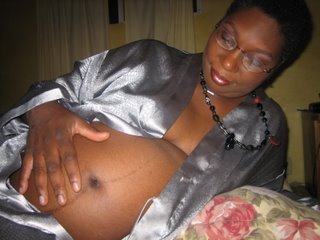I learned about a phenomenon that is probably ubiquitous in international medicine, and relief circles. It was however, new to me. On this particular trip, it was referred to as 'getting your Haitian MD.' I'll tell you a story that illustrates this phenomenon.
While at the Haitian Family Mission on the fourth day, we were in the midst of our outdoor clinic, under the almond tree. A man arrives carrying his crying little boy. Being in acute distress, they are ushered to the front of the line. The little boy has lacerated his finger while playing atop a building debris pile. (Remember, the piles of rubble are everywhere. Most of the buildings appear to be built of concrete, and it is piled mountain high with wires and metal pipes shooting out all over. They must be very tempting for a little boy.) It is a very severe cut requiring three or four stitches. There is no doctor with us on this particular day. I am on a team with a pharmacy tech, a couple of medics, an EMT, and a non-medical. The doctor working with the mission is on vacation. I am selected to do the stitches. Now I have only done stitches on uncooked chicken breasts. But thats more experience than anyone else on the team. We could send him to a hospital, but he might wait hours (even days). He's at the top of our clinic list, but he would be at the bottom at a hospital. So I resign myself to doing my first stitches on a real person. I draw up the lidocaine after locating a suitable needle and syringe and am about to administer it when I hear, "Here comes so and so, she can do stitches. She does them all the time." Talk about saved by the bell. I happily hand my syringe off to so and so and proceed to assist her as she administers four neat and tidy little stitches into the tiny finger. After she's done I wrap the finger in guaze and with the help of an interpreter, give Dad instructions on care and returning to have them removed. This shouldn't be a problem since the stitcher lives at the mission. Later in the day, when I ask the stitcher what specialty of nursing she practices, she stated matter of factly that she wasn't a nurse at all. Taken somewhat aback, I asked her what her training was in. She told me her formal training was something akin to a medic (I'm not sure what that training is.) I ask her where she learned to do stitches. She told me that even though she has very little formal training, she learned her skills from various doctors and nurses that pass through the mission. They let her observe and try skills out as they guide her. She got her training informally, hence, the "Haitian MD." She wore a white lab coat and had a stethoscope around her neck. It's true that even I was diagnosing and treating in the tent cities. I was treating diseases I had never even seen or heard of before. Does this sort of thing result in subpar care? I'm sure it must. Twice, my interpreter KiKi diagnosed my patients when I had no idea what I was looking at. A child came with a hard white plaque on her tongue and upper palate. I thought it was yeast until I palpated it and found it hard and unmoveable. I had never seen anything like it. I asked the other healthcare providers. They didn't know either. Then KiKi spoke up. "I don't know what the name is in English, but in Kreyol, we call it 'shunk' and they treat it by rubbing it with lemon and salt until it is rubbed off. It comes from kids putting all kinds of dirty things they find into their mouths." Well that was good enough for me. "Kiki, tell the Dad what you just told me, and tell him the treatment." I was horrified to think what that pretty little girl had put in her mouth to cause that awful looking fungal growth. She could no longer eat, and could barely talk. I shuddered even more to think of her Dad scrubbing her tongue with lemon and salt until it bled. But hey, I couldn't come up with anything better. The home grown cure seemed reasonable to me. We didn't have any antifungals except those to treat a yeast infection, and this was no yeast infection. In that moment I didn't think of KiKi as overstepping his bounds as an interpreter. I was very grateful to him for giving guidance on something I had never seen the likes of. My trip had been filled with many moments when I was looking around thinking, 'should I be doing this?' (things I would never be allowed to do 'back home.' But I wasn't at home. There was no one else to do it and I was knowledgeable (sometimes) and willing (everytime). In those moments, I know I too was getting my "Haitian MD."

No comments:
Post a Comment